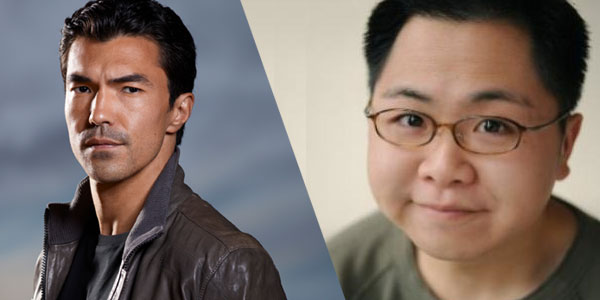 By Ken
By Ken
Esteemed reporter Ted Chen recently interviewed Ian Anthony Dale, the star of the NBC scripted series The Event, in a spotlighted conversation before an audience. Besides being remarkably charismatic and astonishingly handsome, the actor is keenly aware of the public image of himself and of others. Faced with some tough questions lobbed by the skilled journalist, Dale was adept and articulate with his answers such as those about choice of roles and representation of Asian Pacific Islanders in media.
Both grounded in perspective and cognizant about the disparity in diversity in opportunities and representation, Dale expressed being somewhat uncomfortable with some of his early role choices. He joked with self-deprecation about being given an award for one of the worst accents in film for his work in, I believe, Mr. 3000. But he relayed that each actor, faced with issues of survival and eating versus playing a demeaning or unflattering role, ultimately makes a decision for herself as to what to do. He commented about how he understands Spike Lee’s disparagement of Tyler Perry’s work and the negative criticism about some of Ken Jeong’s portrayals. He’s not blind to the fact that Hollywood would rather see APIs in the background or as buffoons or oddities. For himself, Dale seems intent on utilizing his fame, much deserved, in crafting an image that he feels both comfortable with and is positive.
Recently CBS announced that Two Broke Girls has been picked up for series. Earlier in the year, I sent AngryAsianMan and Racebending.com excerpts from the audition sides for the show. The show brandishes a horrible Korean immigrant character that speaks in broken English, wears his pants up to practically his pectorals, is uneducated about American holidays, and is called “Rice Lee” by the main character. Apparently the executives and affiliate stations who attend the fests in which pilots are shown and thrown on or off the new fall schedule didn’t seem to mind the portrayal. That would include Nina Tassler, President of CBS, who was awarded for her choices of diversity and inclusion in her programming by no less than the Coalition of Asian Pacifics in Entertainment.
While it would seem an odd choice for Tassler and for CAPE to honor a person capable of propagating a depiction such as the Rice Lee character, what about the actor himself? I’ve been told that Matthew Moy who was cast in the pilot is an extremely sweet person by those who know him personally. At what point, do the choices that one person or one organization make reflect on who or what they are?
Certainly one can learn from Ian Anthony Dale’s looking back on his choices. With his movie star good looks, he’s conscious that his ethnic looks are what most executives focus on. And he knows that with each role he and his fellow APIs play make a formidable impression on the public’s mind. There’s also the realization of the wider marketing mechanics involved with depictions such as Rice Lee.
On paper, it’s good business to not do anything divergent from something that makes a proportion of people laugh, watch, and pay money. If racism is profitable, no executive has to worry about choices, and for the majority, money will always outweigh social good. The green movement became feasible only when it became economically viable.
So, on whose shoulders does it fall on for the Rice Lee ilk: the actor, the executive, the writer and producer, the organization that condones, the activist that condemns silently, or the people who laugh and pay to see it, or those who see nothing wrong with it?
ABOUT KEN: Ken Choy is an actor, writer, community organizer, and producer of Breaking the Bow. He is gay, green, and gluten-free.




